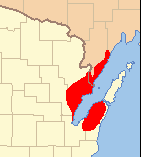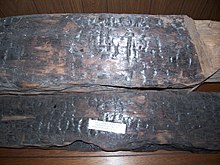| Peshtigo fire | |
|---|---|
 Extent of wildfire damage | |
| Date(s) | October 8, 1871 |
| Location | Peshtigo, Wisconsin |
| Coordinates | 45°03′N 87°45′W / 45.05°N 87.75°W |
| Statistics | |
| Burned area | 1,200,000 acres (490,000 ha) |
| Land use | Logging Industry |
| Impacts | |
| Deaths | 1,500–2,500 (estimated) |
| Damage | In excess of $5 million (estimated) |
| Ignition | |
| Cause | Small embers from slash and burn agriculture were caught up in drafts from unusually high winds during a period of extremely dry drought-like conditions. |
| Map | |

The Peshtigo fire was a large forest fire on October 8, 1871, in northeastern Wisconsin, United States, including much of the southern half of the Door Peninsula and adjacent parts of the Upper Peninsula of Michigan. The largest community in the affected area was Peshtigo, Wisconsin, which had a population of approximately 1,700 residents. The fire burned about 1.2 million acres (490,000 ha) and is the deadliest wildfire in recorded history,[1] with the number of deaths estimated between 1,500[1] and 2,500.[2] The exact number of deaths is debated. Data from mass graves, both those already exhumed and those still being discovered, show that the death toll of the blaze was most likely greater than the 1889 Johnstown flood[3] death toll of 2,200 people or more.[4]
Occurring on the same day as the more famous Great Chicago Fire, the Peshtigo fire has been largely forgotten, even though it killed five times as many people.[5][6]
Nonetheless, several cities in Michigan, including Holland and Manistee (across Lake Michigan from Peshtigo) and Port Huron (at the southern end of Lake Huron), also had major fires on the same day. These fires, along with many other fires of the 19th century had the same basic causes: small fires coupled with unusually dry weather.[7][8]
- ^ a b Biondich, S. (June 9, 2010). "The Great Peshtigo Fire". Shepherd Express. Retrieved November 9, 2011.
- ^ Knickelbine, Scott (2012). The Great Peshtigo Fire: Stories and Science from America's Deadliest Fire. Wisconsin Historical Society Press. ISBN 978-0870206023.
- ^ Cite error: The named reference
sunwas invoked but never defined (see the help page). - ^ "Johnstown Flood: Frequently Asked Questions". National Park Service. October 4, 2018.
- ^ Gibson, Christine (August–September 2006). "Our 10 Greatest Natural Disasters". American Heritage. 57 (4).
- ^ Steele Gordon, John (April–May 2003). "Forgotten Fury". American Heritage. 55 (4).
- ^ Cite error: The named reference
NRHPwas invoked but never defined (see the help page). - ^ "History of the Peshtigo fire, October 8, 1871". The Peshtigo Times. October 6, 1921. Archived from the original on May 2, 2017. Retrieved August 18, 2023 – via Wisconsin Historical Society.

